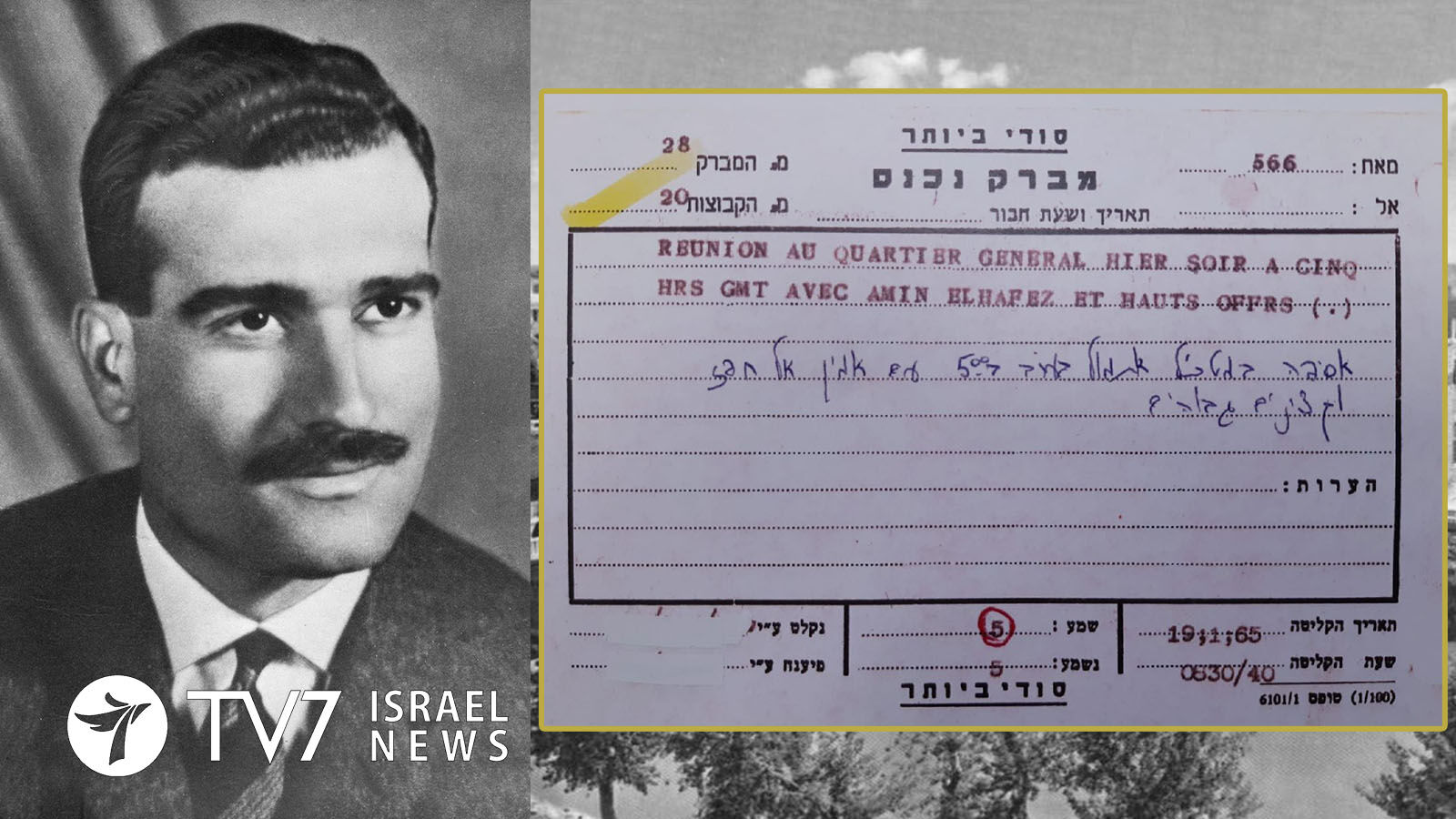The disclosure was delivered by Mossad Director David Barnea during dedication of the Eli Cohen Museum in Herzliya.
By Erin Viner
Eliyahu Ben-Shaul Cohen, a Jewish immigrant to Israel from Egypt, was recruited by the Mossad intelligence agency and dispatched under cover to Syria. Known as “our Man in Damascus,” Cohen infiltrated the highest ranks of the Syrian government from 1961 to 1965. He is credited with passing key information that proved vital to Israel’s victory over Syrian forces in the 1967 Six Day War prior to his capture and execution.
Laying to rest a decades-old debate about one of its most famous spies, the Mossad Director said recent investigation has concluded that Cohen was caught only due to the interception of his messages by the enemy.
“Eli Cohen was among our best agents. He continues to influence us and instill in us a fighting spirit, courage, values and devotion – even from the depths of history. He is a source of inspiration not only to today’s agents but to all Mossad employees in their various positions. We all learn from him, even today, from his Zionism, his sacrifice and his dedication,” said Director Barnea, dismissing unfounded speculation that Cohen may have tipped off the Syrians by sending too many messages perhaps under duress from his handlers, or diverted from instructions.
“Eli Cohen was captured because his transmissions were simply intercepted and triangulated by the enemy,” emphasized Barnea, underscoring that it was his honor to reveal this “intelligence fact” for the very first time. (See full text of Mossad Director Barnea’s remarks below).
While the original telegram is kept at the National Archive, the new museum will exhibit a copy of Cohen’s last cable – dated 19 February 1965 – the same day on which he is estimated to have been captured – reporting a meeting of the Syrian General Staff meeting held the previous evening with the participation of then Syrian President Amin Al-Hafez.
Cohen was arrested by Syrian officials who used Soviet-made tracking equipment and the assistance of Soviet advisors during transmission to Israel. He suffered extensive torture and was ultimately sentenced to death after being convicted of espionage by a military tribunal. Despite a worldwide campaign for clemency led by then-Israeli Prime Minister Golda Meir, Cohen was publicly hanged in Damascus’ central Marjeh Square on 18 May 1965.
Despite repeated pleas over the past six decades, successive Syrian regimes have refused to hand over Cohen’s remains. His body is believed to have been relocated on numerous occasions to prevent Israel from repatriating it through clandestine means, and his burial site remains unknown. A memorial stone in memory of the married, father-or-three been placed in the “Garden of the Missing Soldiers” at the Mount Herzl national cemetery in Jerusalem, and many Israeli streets and neighborhoods bear his name in tribute.
In 2016, Israeli intelligence operatives managed to retrieve the fallen agent’s watch, described in a Mossad statement as being part of his “operational image” and Arab alias Kamel Amin Thaabet, worn at the time of his capture. Cohen’s widow Nadia said at the time that she felt as though the timepiece was a part of her late husband, and that she was very moved by the agency’s efforts to bring it home.
Full Text of Mossad Director Barnea’s Remarks
“Eli Cohen was among our best agents. He continues to influence us and instill in us a fighting spirit, courage, values and devotion – even from the depths of history. He is a source of inspiration not only to today’s agents but to all Mossad employees in their various positions. We all learn from him, even today, from his Zionism, his sacrifice and his dedication.
The reason for Eli Cohen’s capture has always been controversial. Did he transmit too much? Did he act contrary to the directives? Did headquarters demand that he transmit too intensively? The issue has been subject to dispute for many years. I will honor this holy place and reveal, for the first time, following in-depth research that was carried out recently, that Eli Cohen was not captured due to the quantity of his transmissions or pressure from headquarters to transmit too frequently. Eli Cohen was captured because his transmissions were simply intercepted and triangulated by the enemy. This is now an intelligence fact.
Today, the Mossad will give to the Museum the last telegram that Eli Cohen sent as a free man. The telegram is dated to 19 February 1965, the day of his capture, on which he reported about a discussion at the Syrian General Staff with the participation of then President Amin Al-Hafez. The Mossad has worked, and will continue to work, to reveal intelligence and new details about the period in which Eli Cohen served in Syria, and will continue to work to bring his remains for burial in Israel.
Eli is a symbol for many agents, each one of whom operated in their own generation, over many decades, and who risked their lives while working with professionalism and dedication and contributing to the security of the State and People of Israel.
Even across the years, we salute a brave agent who was at the forefront of the secret campaign of the Mossad and the State of Israel. We honor his memory and learn from his legacy.”
